News
Court dismisses Nnamdi Kanu’s rights suit against FG
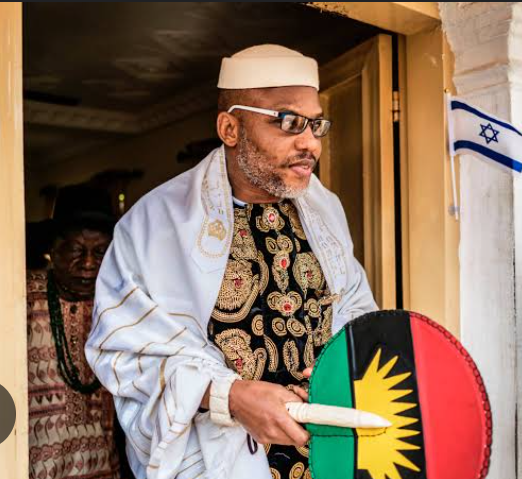
By Francesca Hangeior
Justice James Omotosho of the Federal High Court in Abuja has dismissed the fundamental human rights suit filed by the detained leader of the Indigenous People of Biafra (IPOB), Nnamdi Kanu, against the Federal Government.
Kanu sued the Attorney-General of the Federation and the Department of State Service for ₦1bn in damages for alleged rights violations.
The IPOB leader claimed that the DSS and its director general violated his right to a fair hearing by allegedly preventing his lawyers from having unhindered interactions with him while he was being detained in preparation for his defence in his criminal
While delivering judgment, Justice Omotosho, held that Kanu failed to provide credible evidence to sustain his claims that his interactions with his lawyers were interfered with, that he was denied unhindered access to his lawyers, and that DSS officials eavesdropped on his conversations with his lawyers, which constituted a breach of his right to a fair hearing.
Justice Omotosho held that the claims that Kanu was denied unhindered access to his lawyers by the operatives of the DSS, and that the officials eavesdropped on his conversations with his lawyers in the preparation for his defence, could not be established.
The IPOB leader, through his lawyer, Aloy Ejimakor, had sued the Federal Republic of Nigeria (FRN), Attorney-General of the Federation (AGF), DSS, and its DG as 1st to 4th respondents, respectively.
In the originating summons, he prayed for eight reliefs.
He also sought a declaration that the respondents’ act of preventing his counsel from taking notes on the details of counsel’s professional discussions/consultations with him at DSS detention was unlawful.
He further sought a declaration that the respondents’ act of eavesdropping on his confidential consultations/conversations with his lawyers amounted to a denial of his right, among others.
Kanu, therefore, sought an order of injunction restraining and prohibiting the respondents from their act of forcible seizure, and photocopying of confidential legal documents brought to him at the detention facility by his lawyers.
He also sought an order mandating the respondents to jointly and severally pay the sum of ₦1bn as damages for the mental, emotional, psychological, and other damages he suffered as a result of the breach of his rights, among others.
But in a counter affidavit, the DSS denied allegations levelled against it.
In the application deposed to by Yamuje Benye, a legal department staffer, he said 11 paragraphs in Kanu’s affidavit were untrue.
He stated that Kanu was in safe and secured custody of the DSS, and that he was not detained in solitary confinement.
According to Benye, Kanu was allowed access to his family members and team of lawyers on his visiting days, without any hindrance whatsoever.
He argued that the IPOB leader was permitted to interact and consult with his lawyers on his visiting days without any interference.
He said at no time did any DSS personnel seize or confiscate documents brought to Kanu by his lawyers or any other person.
He added that their personnel never denied Kanu’s lawyers the professional liberty to perform their lawful duty of discussing, consulting, and interacting with his lawyers.
The applicant has consistently requested that various prayer books and religious materials be brought to him as part of his fundamental human right,” he said.
Benye added that Justice Binta Nyako, who is presiding over Kanu’s criminal trial, has always maintained that visits to him should always be under supervision, as it is the best practice all over the
According to him, mister Kanu, along with his counsel, was permitted to consult and interact on visiting days in one of the best interview facilities of the DSS to ensure maximum comfort of the applicant and his visitor(s).
The official, who denied allegations that the personnel usually record their interaction during visits, said “there is no basis for eavesdropping and recording of their conversations.”
He said, in line with the Service Standard Operation Procedure (SOP) of the State Security Service, all visitors to her facility are subjected to normal routine security checks, and items in their possession are scanned.
According to him, this is to avoid unauthorised materials making their way into the facility.
News
Five countries with easy work visas in 2025
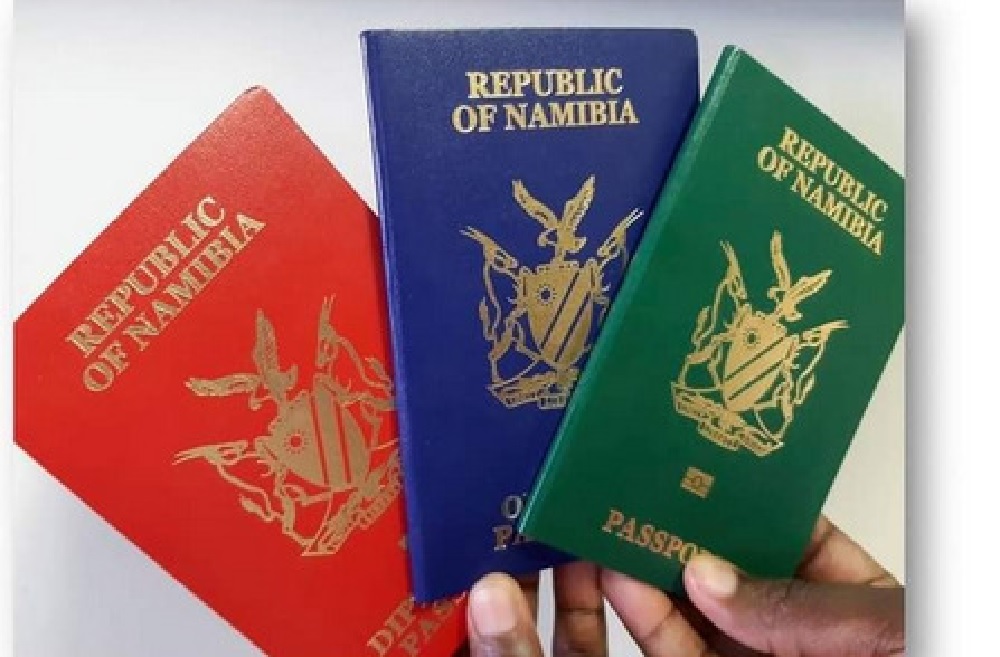
If you’re seeking countries that offer accessible work visas in 2025, it’s advisable to research each country’s specific requirements and processing times to determine the best fit for your career goals.
Here are some top destinations known for their streamlined processes and demand for skilled professionals.
Canada
Because of its reputation for having a diverse and welcoming society, Canada is a popular destination for foreign workers. The nation provides a number of immigration initiatives, including the Express Entry system, which expedites the process of granting skilled workers permanent residency. Canada has a strong economy and a great standard of living, making it a popular choice for international labor.
Germany
Germany is well known for its robust economy and friendly disposition toward foreign workers with advanced degrees. For highly qualified individuals, the nation offers a variety of work visa options, including the EU Blue Card. For those looking for professional opportunities, Germany is a desirable destination due to its strong job market and high standard of living.
Australia
Australia is a desirable option for people looking for work abroad due to its robust economy and high demand for skilled labor. To entice gifted people from all over the world, the nation provides a number of visa options, such as the Temporary Skill Shortage Visa and the Skilled Independent Visa. Australia is a popular destination for foreigners due to its stunning scenery and relaxed way of life.
The UAE, or United Arab Emirates
For foreign workers looking for work in industries like finance, tourism, and healthcare, the United Arab Emirates (UAE) is a desirable destination due to its tax-free income opportunities and opulent lifestyle. Through programs like the Employment Visa and the Investor Visa, the nation grants work visas, giving foreign employees access to a wide range of employment options in a booming economy.
New Zealand
New Zealand is renowned for its breathtaking scenery and hospitable immigration policies. Through initiatives like the Essential Skills Work Visa and the Skilled Migrant Category Visa, the nation provides work visas, which facilitate foreign workers’ ability to find employment across a range of industries. New Zealand has a great standard of living and welcomes residents, making it a popular choice for foreigners.
News
2nd Republic surviving governors: The last men standing
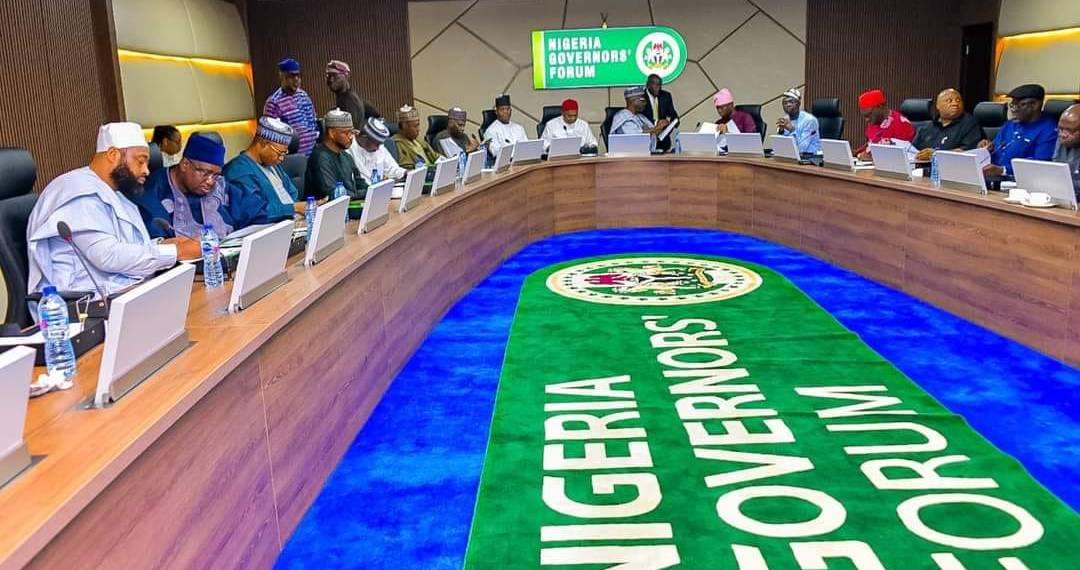
With the passage, last week, of one of the two 2nd Republic governors, a former governor of Oyo State, Victor Omololu Olunloyo, Nigerians recall with nostalgia, how eventful the politics of that era was and the characters that shaped the activities of that period.
Olunloyo was one of the politicians of that era that enlivened politics in the Southwestern part of the country and that of the old Oyo state in particular.
His push for the Agodi Hills Government House and the way he upstaged the highly popular Bola Ige, who was one the protégés of the then Unity Party of Nigeria (UPN) leader, Chief Obafemi Awolowo, charged the political atmosphere in 1983.
The episode between UPN and the National Party of Nigeria (NPN) in Oyo, represented only a modicum of the high drama, suspense and chicanery that characterised the 2nd Republic politics.
Opposition coalition should worry Tinubu – Ndume
Jama’a Emirate Sallah durbar unites diverse tribes in Kafanchan
Many say they miss the set of governors of that period because they were development driven and brought about infrastructural and economic transformation in their respective states.
Currently, however, only two of the governors that took the oath of office on October 1,1979, Awwal Mohammed of Niger State and Jim Nwobodo of Anambra State, are around out of 19.
In addition to the 19, four of the governors were replaced in various circumstances bringing the number of those that reigned between October 1 1979 and October 1, 1983 to 23.
The original 19 were, Mr. Jim Nwobodo, Anambra; Alhaji A. Tatari Ali, Bauchi ; Prof. Ambrose Alli, Bendel; Mr. Aper Aku, Benue; Alhaji Mohammed Goni, Borno; Dr. Clement N. Isong, Cross River; Alhaji Abubakar A. Barde, Gongola, Mr. Sam Mbakwe, Imo; Alhaji Balarabe Musa, Kaduna; Alhaji Mohammed A. Rimi, Kano; Alhaji Adamu Atta, Kwara; Alhaji Lateef K. Jakande, Lagos, Alhaji M. Awwal Ibrahim, Niger; Chief Bisi Onabanjo, Ogun; Chief Michael A. Ajasin, Ondo, Mr. Bola Ige, Oyo; Chief Solomon Lar, Plateau; Chief Melford O. Okilo, Rivers; and Alhaji Shehu Kangiwa, Sokoto.
Kangiwa, however, died two years into his tenure and was succeeded by Garba Nadama while Balarabe Musa was impeached and his deputy, Abba Musa Rimi, took over as governor for the remaining part of his tenure.
Close to the 1983 elections, Rimi resigned from office and was replaced as governor by his deputy, Abdu Dawakin Tofa, while Abubakar Barde of Gongola, also resigned and left the seat for his deputy, Wilberforce Juta.
After the 1983 elections, nine of the 1979 set of governors did not return. They were; Bola Ige, Ambrose Ali, Mohammed Goni, Abubakar Rimi, Adamu Attah, Abubakar Barde, Abba Musa Rimi and Jim Nwobodo and Clement Isong. Omololu Olunloyo took over in Oyo; Sabo Bakin Zuwo, Kano; Asheik Jarma, Borno; Cornelius Adebayo, Kwara; Chief Christian Onoh, Anambra, Samuel Ogbemudia, Bendel, Don Etiebet, Cross River and Lawal Kaita, Kaduna.
With the demise of Omololu Olunloyo, three of those that assumed office in 1983, Bamanga Tukur of the then Gongola State, Asheik Jarma of Borno and Cornelius Adebayo of Kwara State are around.
In summary, 32 persons occupied the various state government houses between 1979 and December 1983 at various stages in the 4 year, three months period the 2nd Republic lasted.
Weekend Trust went in search of the last men standing, who are now in their 80s.
Most of the 2nd Republic governors occupied the seat when they were in their 30s and early 40s with few like Jakande and Onabanjo who were in their 50s.
The ruling party NPN which won seven out of the 19 states like Bauchi , Sokoto, Benue, Rivers, Cross River, Kwara and Niger in 1979, was able to extend its tentacles by capturing other states like Anambra, Oyo, Gongola and Borno in 1983 but lost Kwara.
Muhammad Awwal Ibrahim
His Royal Highness Muhammad Awwal Ibrahim is the current Emir of Suleja and ranks third in the hierarchy of the eight first-class emirs in Niger State—following the Etsu Nupe, who is also the chairman of the Council of Traditional Rulers, and the Sarkin Sudan of Kontagora, who serves as the vice chairman.
The emir has served as the Chairman of the Niger State Committee for the Integration of Quranic Schools since 2008. He is said to have actively led the committee, despite challenges stemming from the government’s lack of commitment to creating an enabling environment for the effective operation of the Integrated Quranic Model Schools across the state.
A source close to the palace told Weekend Trust that the last time the Emir attended a public function—including those he was invited alongside his fellow emirs—was in 2024.
He added that due to health challenges, the emir is currently out of the country and has not participated in any public event recently.
“He attended public functions with his fellow emirs throughout most of 2024. But the last time he attended a public function even with his fellow emirs was last year. In fact, he is not in the country now because of ill health,” he said.
James Ifeanyichukwu Nwobodo
Jim, as he is popularly called, is currently residing at his Amaechi Awkunanaw country home in Enugu-South Local Government Area of Enugu State.
At 84, those close to the former governor said he still attends public events and confirmed that he still looks his old cheerful and vibrant self.
Though, he is said to be offering counsel to upcoming and serving politicians, for someone who was in the senate between 1999 and 2003 and even indicated interest in vying for the presidency, his political engagements are no longer as much as before.
An ally of his, who pleaded anonymity in a telephone interview, said, “Chief Jim Nwobodo is active and attends social functions but not as before due to age. He has been sighted at some functions in Abuja also.
At 89, the former governor of Gongola State and former chairman of the Peoples Democratic Party (PDP) has considerably slowed down his political engagements. He has not been sighted at any public function recently.
A former aide to the former governor who was contacted said he has not met with him for over a year now, but stated that he still resides in his Abuja residence where he receives family and friends who go to see him.
A clip of the former president of the Africa Business Roundtable (ABR) on a wheel chair recently circulated online which caused a stir. But the former aide could not confirm the image was, but promised to make inquiries and get back to our correspondent on it. He was yet to do so at press time.
Visitors at the Bamanga Tukur Garden at Wuse ii say they see him sometimes wheeled to the garden to enjoy the fresh air in the cool of the evening.
His chairmanship of the PDP brought back the NPN days when he wanted to ensure the principle of party supremacy but the pressure mounted by some of the governors of that period saw him quit to be replaced by a former governor of Bauchi State, Ahmadu Muazu.
One of his sons, Awwal was in the House of Representatives and is known to have taken active interest in politics.
Cornelius Adebayo
When our correspondent visited the residence of the former governor at the GRA Ilọrin, Kwara State, some of the domestic workers in the house said the 84-year-old former governor no longer spends a lot of time in Ilọrin, that he is mostly in Abuja.
However, his community back home in Oke-Onigbin, Isin Local Government Area of Kwara State, still celebrates him for opening up their community through the facilitation of telecommunications network during his ministerial tenure.
Sources said the former governor is no longer as active as before in the politics of Kwara State due to age, but that his children are gradually taking over on the public turf.
A resident of the area who simply identified himself as Mr Harun said the former governor has indeed slowed down in his activities.
“He is a lover of people, very compassionate and always at home with family, friends and relatives. I know of some of his staff members who have been with him for over 20 years. Many widows and relatives are still on his payroll till today.
“Although he is not a farmer like his children, he invested in farming. Before, he used to come to Ilọrin more frequently and always celebrated Easter with family and friends here.
“However, he was not around during the last Easter due to his health. Except when he goes for treatment abroad and spends one to two months, he loves to visit home. He loves joking with people a lot no matter their status and once he is convinced about a course or decision, you can hardly influence him.
“His children had wanted to renovate or rebuild his GRA residence to reflect his “status” which is also a stone throw from that of former governor, Abdulfattah Ahmed, but he rejected the gesture that he is comfortable with the way it is. That is Chief Cornelius Adebayo for you.
“He is close to Governor AbdulRahman AbdulRazaq who consults him frequently. In fact, one of his children, Mrs Oluwatoyosi Thomas, was appointed a commissioner in Kwara State while one of his sons, Mr Cornelius Oluwasegun Adebayo, is the Executive Secretary/Chief Executive Officer of the National Agricultural Land Development Authority (NALDA)”, the source said.
In addition to being a former governor, Adebayo is also a former senator and former minister.
Asheik Jarma
Alh. Asheik Jarma is a founding member of the Peoples Democratic Party (PDP) but has lived a quite life since leaving government House Maiduguri in 1983 when the military struck and sacked the 2nd Republic.
A source close to the family said the former governor lives in Maiduguri and is in good health.
He said however that Alhaji Jarma has withdrawn from active politics and hardly appears at public functions or visits unless it becomes compulsory.
“I can confirm to you that Baba is fine health wise is just that he has aged and has retired,” the family source stated.
“For some time now he hardly goes out but does so when he cannot avoid it like funerals and condolence visits,”he stated.
Our correspondent confirmed that he has been playing advisory roles to political leaders in the state and still offers advice to the younger ones when he consulted.
He was one of those who had the shortest stays at Government House as he was in office for only three months between October and December 1983.
The source said the last time he appeared in public was during the first term of Governor Babagana, when former governors, Borno elders and traditional rulers gathered to chart a way for the development of Borno State.
Credit Weekend Trust
News
Troops arrest 49 oil thieves, dismantle 22 illegal refining sites
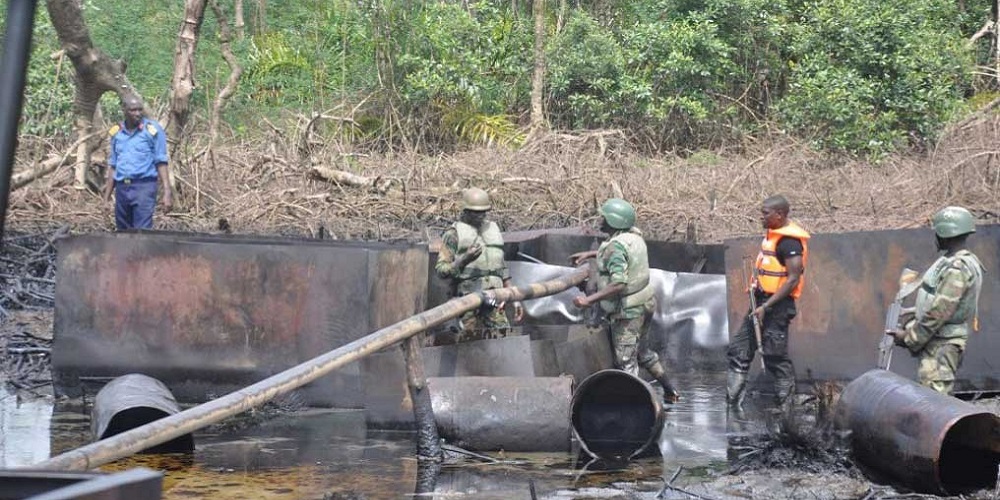
The Defence Headquarters says the troops of Operation Delta Safe, have in the last one week apprehended 49 perpetrators of oil theft and destroyed 22 illegal refining sites.
The Director, Defence Media Operations, Maj.-Gen. Markus Kangye, made this known in a weekly report of ongoing military operations by the Armed Forces of Nigeria, on Friday in Abuja.
Kangye said the troops had during the week foiled oil theft worth an estimated sum of N869.2m.
The breakdown, according to him, indicates 325,990 litres of stolen crude oil, 24,645 litres of illegally refined Automotive Gas Oil (AGO) and 19,500 litres of Premium Motor Spirit (PMS) and 1,600 litres of engine oil were recovered.
“Additionally, troops discovered and destroyed 86 crude oil cooking ovens, 181 dugout pits, 25 boats, a speedboat, 18 storage tanks, 316 drums and 22 illegal refining sites.
“Other items recovered include generator set, jack, galvanised pipes, pumping machines, drilling machines, tricycles, motorcycles, mobile phones and 18 vehicles,” he said.
Kangye said the military, in collaboration with other security agencies, had continued to demonstrate bravery, discipline, and professionalism in the face of evolving security threats.
He said the troops neutralised several insurgents, rescued hostages, apprehended suspects, and recovered arms and ammunition during the week.
He added, “Our operations have continued across various theatres of operations comprising the North East, North West, North Central South-South and other regions where criminals seek to disrupt peace and stability.
“Troops remain committed to their constitutional responsibility of safeguarding the sovereignty, unity, and territorial integrity of Nigeria, as well as ensuring the safety and security of all citizens.
“Between April 3 and April 10, troops recovered huge quantities of assorted arms including various kinds of machine guns, RPG tubes, automatic weapons as well as locally fabricated guns and Improvised Explosive Devices.
“Additionally, a huge cache of assorted 7.62mm and 9mm ammunition, as well as live cartridges were also recovered.”
NAN
-

 News17 hours ago
News17 hours agoConstituents Drag Akpabio, Senate to Court Over Suspension of Natasha
-
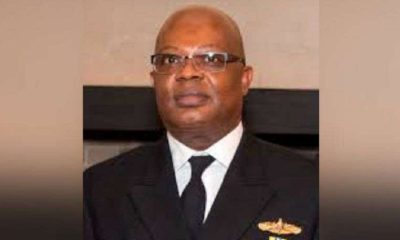
 News22 hours ago
News22 hours agoIbas pouring petrol on fire in Rivers, Briggs laments
-

 News16 hours ago
News16 hours agoFCT minister, Wike gives land allotees 21 days to pay or lose offer
-

 News23 hours ago
News23 hours agoPAINFUL! Six Persons Perish In Helicopter Crash
-
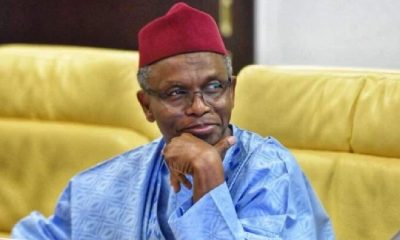
 News3 hours ago
News3 hours agoWe only had lunch with Buhari not 2027 politics -El-Rufai
-
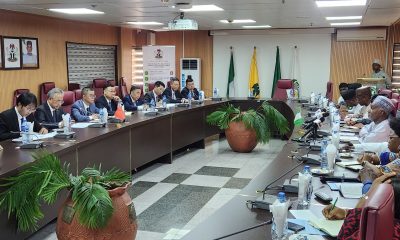
 News17 hours ago
News17 hours agoNigeria-China Reaffirms Commitment To Strategic Partnership
-

 News22 hours ago
News22 hours agoInsecurity: Group calls on Tinubu to declare state of emergency in Zamfara
-

 News3 hours ago
News3 hours agoParts of Abuja, Niger in total darkness -AEDC confirms






